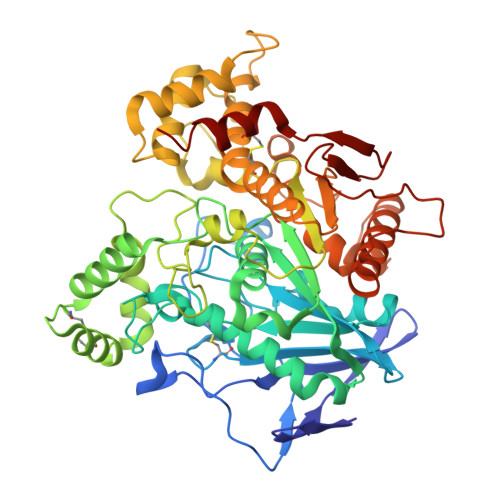Targeting Neuroinflammation and Cognitive Decline: First-in-Class Dual Butyrylcholinesterase and p38 alpha Mitogen-Activated Protein Kinase Inhibitors.
Ferjancic Benetik, S., Proj, M., Knez, D., Kosak, U., Meden, A., Krajsek, K., Pislar, A., Horvat, S., Svajger, U., Tesic, N., Pulkrabkova, L., Soukup, O., Skarka, A., Andrys, R., Brazzolotto, X., Igert, A., Nachon, F., Dias, J., Detka, J., Gdula-Argasinska, J., Wyska, E., Szafarz, M., Manik, A., Plachtij, N., Musilek, K., Salat, K., Obreza, A., Gobec, S.(2025) J Med Chem 68: 17378-17411
- PubMed: 40779804
- DOI: https://doi.org/10.1021/acs.jmedchem.5c00933
- Primary Citation of Related Structures:
9D75, 9D7N, 9I5O, 9I5P, 9I5Q - PubMed Abstract:
The currently approved drugs for the treatment of Alzheimer's disease (AD) fail to address its interconnected pathological processes. Inhibition of butyrylcholinesterase (BChE) and p38α mitogen-activated protein kinase (p38α MAPK) offers an innovative dual approach to mitigate two major drivers of neurodegeneration in AD: cholinergic deficit and neuroinflammation. Using structure-based drug design and a library of known p38α MAPK inhibitors, we developed first-in-class, selective dual BChE/p38α MAPK inhibitors with balanced activity against both targets. The X-ray crystal structures of the two most promising molecules bound to both enzymes were solved. Those ligands effectively reduced the production of proinflammatory markers in vitro and ex vivo in phytohemagglutinin/lipopolysaccharide neuroinflammation models. Remarkably, these compounds also significantly improved cognition in scopolamine- and lipopolysaccharide-induced models of cognitive dysfunction in mice. Because our dual-acting inhibitors target both the symptoms and the underlying neuropathology, they offer an innovative and comprehensive strategy to combat AD.
- Faculty of Pharmacy, Department of Pharmaceutical Chemistry, University of Ljubljana, 1000 Ljubljana, Slovenia.
Organizational Affiliation:

























